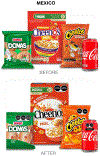Towards unified and impactful policies to reduce ultra-processed food consumption and promote healthier eating
- PMID: 33865500
- PMCID: PMC8217149
- DOI: 10.1016/S2213-8587(21)00078-4
Towards unified and impactful policies to reduce ultra-processed food consumption and promote healthier eating
Abstract
The global surges in obesity and nutrition-related non-communicable diseases (NCDs) have created a need for decisive new food policy initiatives. A major concern has been the impact of ultra-processed foods (UPFs) and ultra-processed drinks on weight gain and on the risk of several NCDs. These foods, generally high in calories, added sugar, sodium, and unhealthy fats, and poor in fibre, protein, and micronutrients, have extensive negative effects on human health and on the environment (due to their associated carbon emission and water use). There is a growing tendency worldwide, and especially in South America, for food companies to add micronutrients to UPFs to make health claims regarding these products, to which food-regulating authorities refer to fake foods. Although more than 45 countries and smaller subregional or urban entities have created taxes on ultra-processed drinks, such as sugar-sweetened beverages, only a few have adopted taxes on snacks and other UPFs, and none have added major subsidies for truly healthy, fresh or minimally processed food for people from lower socioeconomic backgrounds. Another major focus has been on developing effective package labelling. A smaller number of countries have selected the most impactful warning labels and linked them with other measures to create a mutually reinforcing set of policies; a few other countries have developed effective school food policies. We herein present in-depth results from key countries involved in all these actions and in comprehensive marketing controls, and conclude with our recommendations for the future. This field is quite new; progress to date is substantial, but much more is left to learn.
Copyright © 2021 Elsevier Ltd. All rights reserved.
Conflict of interest statement
Declaration of interests BMP, SWN, and LST report grants from Bloomberg Philanthropies, the Laura and John Arnold Foundation, the Robert Wood Johnson Foundation, and the National Institutes of Health (NIH) (CPC P2C HD050924, P30 AG066615, NIH R01DK108148). KJH reports grants from the South African Medical Research Council (D1305910-03). ECS reports being a principal investigator on research projects funded by Bloomberg Philantropies through a sub-agreement, and by the Canadian International Development Research Center. All other authors declare no competing interests.
Figures
Comment in
-
Food policies: in times of COVID-19 and beyond.Lancet Diabetes Endocrinol. 2021 Jun;9(6):319. doi: 10.1016/S2213-8587(21)00123-6. Epub 2021 May 7. Lancet Diabetes Endocrinol. 2021. PMID: 33971137 Free PMC article. No abstract available.
References
-
- World Cancer Research Fund/American Institute for Cancer Research. Diet, nutrition, physical activity and cancer: a global perspective. London: World Cancer Research Fund International; 2018.
Publication types
MeSH terms
Grants and funding
LinkOut - more resources
Full Text Sources
Other Literature Sources




